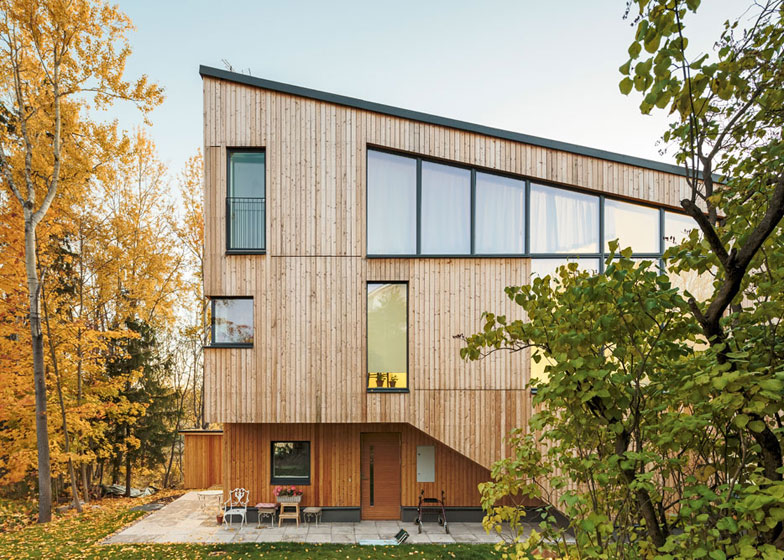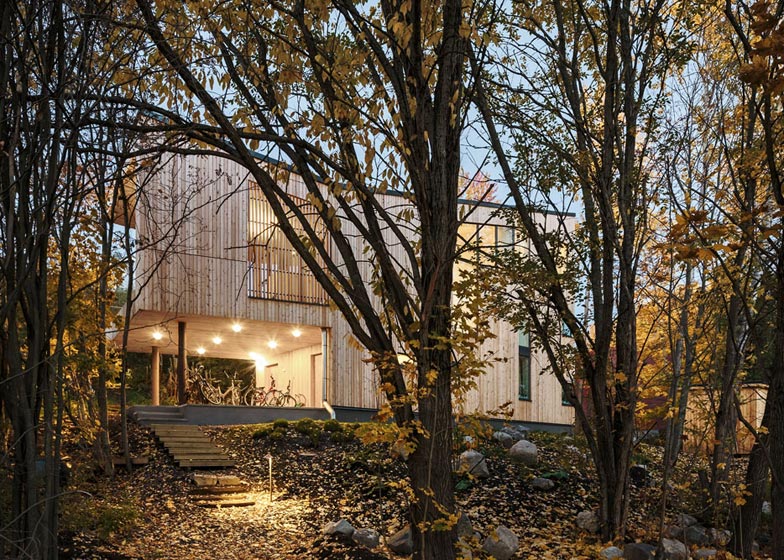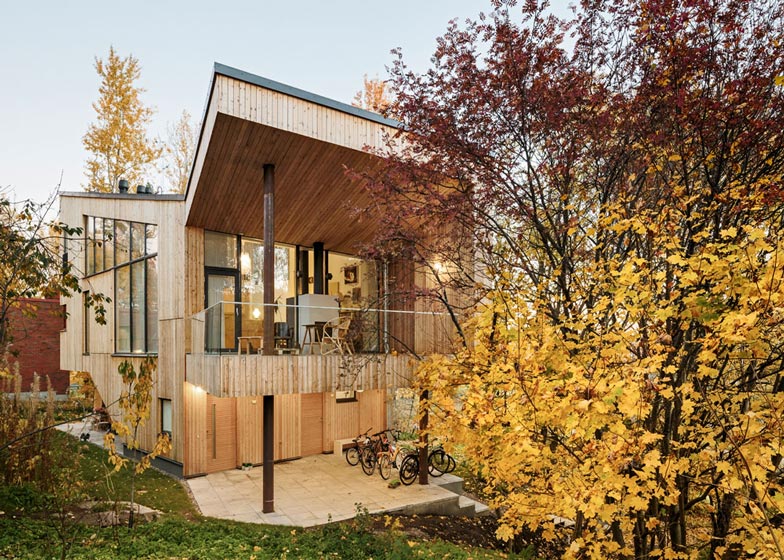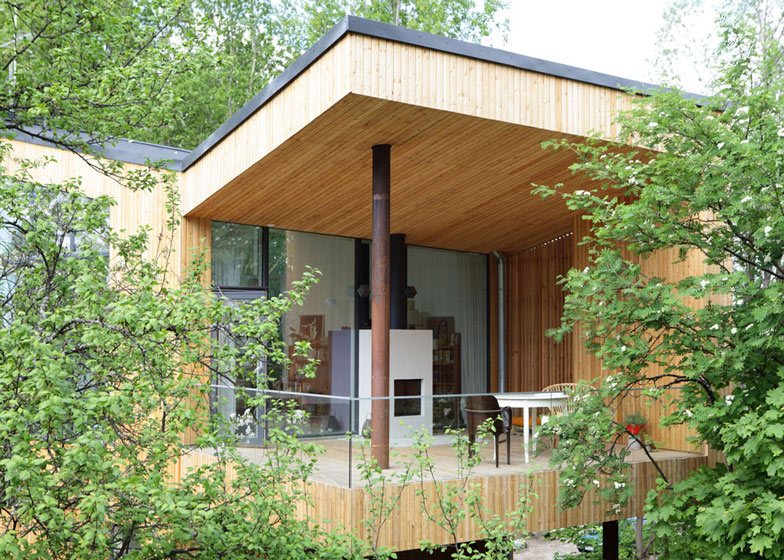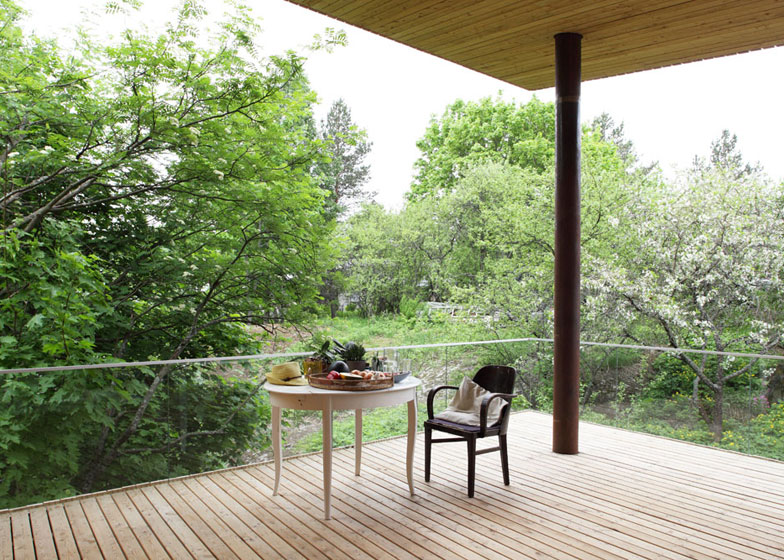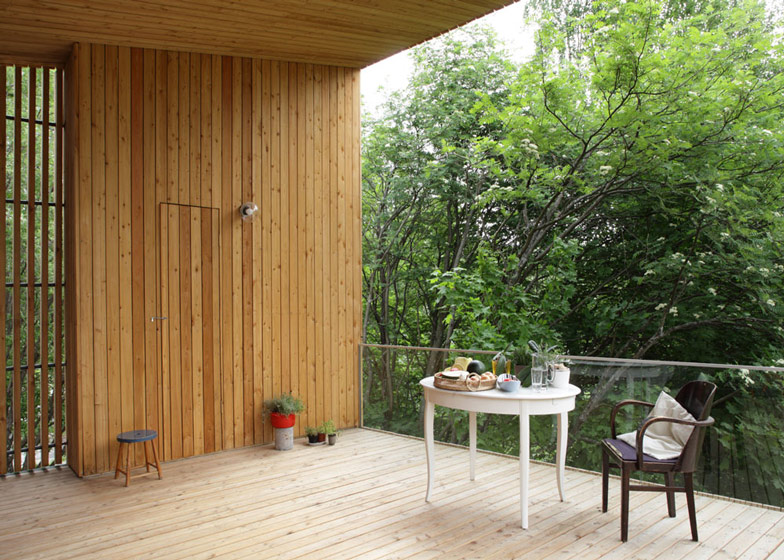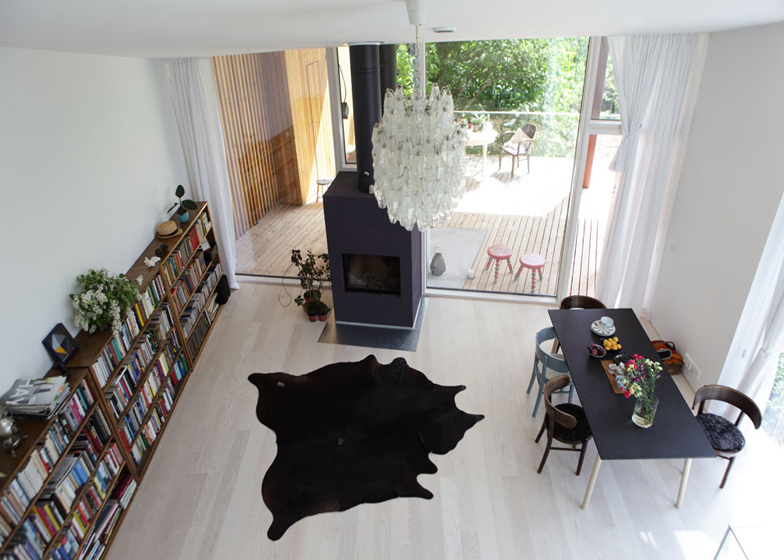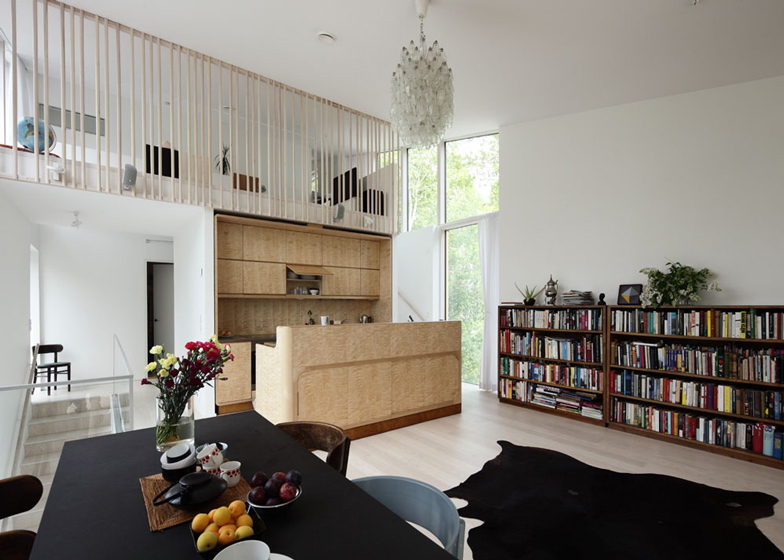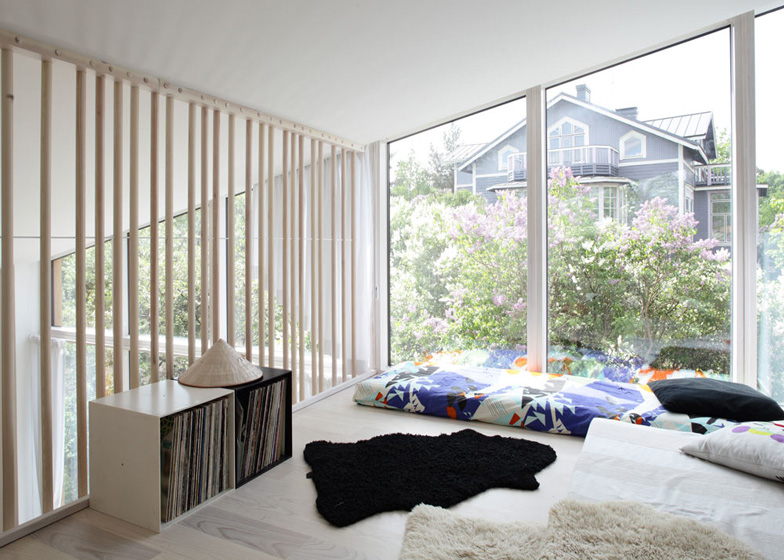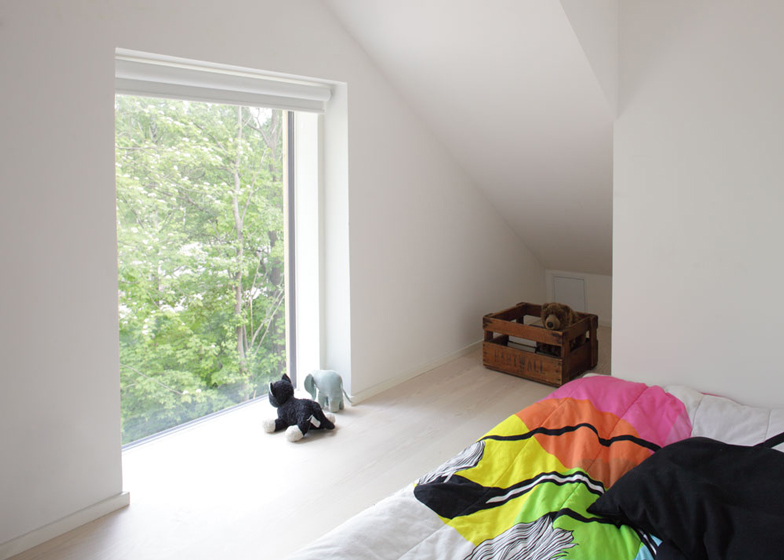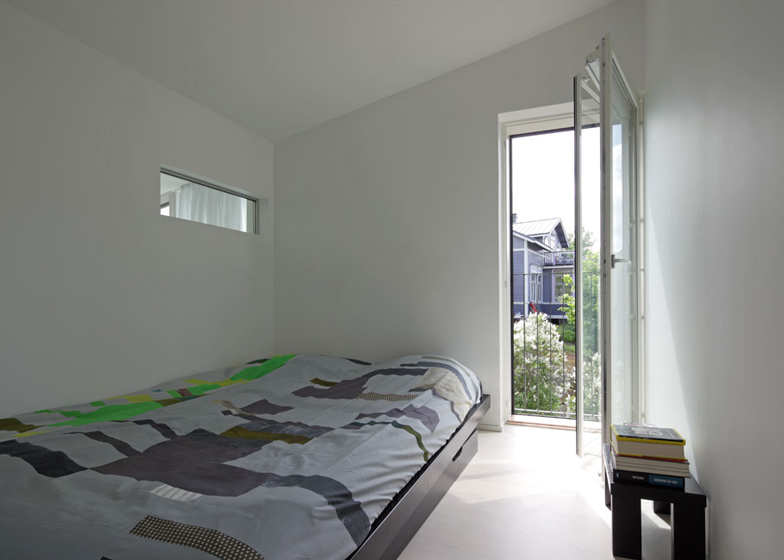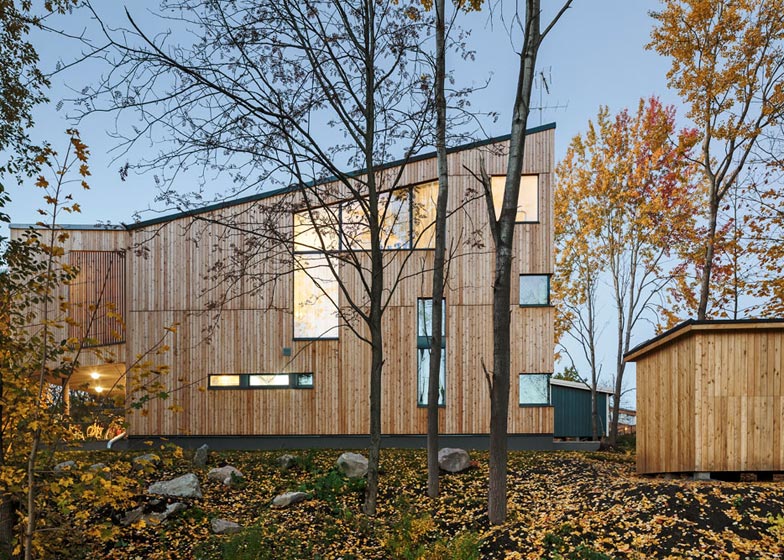This wooden home in Helsinki by Finnish architect Tuomas Siitonen has a roof that dips in the middle to allow views across it and a kinked plan that wraps around a secluded garden (+ slideshow).
Constructed on a sloping plot in the garden of a house occupied by the client's parents, the building was designed by Siitonen to provide two separate apartments - one for a couple and their two children, and another for the children's great-grandmother.
The ground floor contains an accessible apartment for the great-grandmother, while a larger apartment for the family occupies the two upper storeys.
"The brief was to design an inspiring and environmentally sensible house incorporating a separate flat for a grandmother, or for example to be used by one of the children in the future," Siitonen told Dezeen.
The new house's plan kinks to accommodate the contours of the site and to wrap around the garden it shares with the existing hundred-year-old property, increasing privacy while maintaining a connection with its neighbour.
On the other side, the building presents a closed facade to a nearby road and railway, while its height allows views from the upper floors and balcony.
"The plot was a north-facing slope, so I wanted to build something that rises up to provide light and views," said Siitonen.
"The slope faces a busy road and a railway, which is why the house is more closed on that side and opens up towards the garden, making a small sheltering turn that follows the slope to make the terrace feel more intimate and to take the garden into the house."
Siberian larch cladding covers the building's exterior. It will turn grey over time and Siitonen said it was chosen to reflect the house's natural setting.
As well as the accessible self-contained apartment, the ground floor contains utility areas and a sauna.
Upstairs is an open plan living and dining area incorporating a custom-made kitchen built from flamed birch.
Large windows look out onto a large wood-lined terrace perched among the treetops that can be heated by a fireplace that backs onto another one inside the living room.
Another staircase leads past windows that look out over the treetops to a mezzanine that is intended to give the space the feel of a treehouse, and on to the master bedroom housed in the loft.
Sustainability measures were a key part of the clients' brief and informed the use of wood throughout the project and the use of a ground-sourced heat pump and underfloor heating that removes a need for radiators.
Exterior photography is by Tuomas Uusheimo. Interior photography is by Maija Luutonen.
Here's a text about the project by Martta Louekari:
House M-M, Helsinki, Finland
Someone should pick the children up from day-care; the grandparents would appreciate a visit; who’d have time to cook and help with the homework? What if the whole family lived together, on the same plot, even under the same roof?
Actors Vilma Melasniemi and Juho Milonoff wanted a home where the entire family, including grand- parents and great-grandmother could spend their time together. They were looking for space for the family and friends to be together, but also for the chance for everyone to have some privacy and their own room. That way the grandparents could help with childcare and great-grandmother would have company and a feeling of security.
A place was found on the plot of mother Vilma’s parents’ home in Helsinki’s Oulunkylä. The location of the 100-year-old house – in a garden of apple and lilac trees with a steep north-facing slope – imposed its own demands on the design. What was wanted was a house that would be contemporary and yet homely and full of character, that would respect its surroundings and the site’s natural features but would still constitute a clearly self-contained whole.
The new home was designed with two apartments. The lower storey is a level-access studio-apartment for Vilma Melasniemi's 91-year-old grandmother. The ground floor also includes sauna and utility spaces.
The 120 square-metre apartment upstairs is the home of Vilma Melasniemi and Juho Milonoff and their 8 and 11-year-old children. The upstairs is comprised of a large reception room and a kitchen, made to measure in flamed birch, that serve as the whole family’s living space. In the summer this extends effortlessly outdoors via a large terrace.
The three-storey building sits comfortably on the slope, the large windows bringing in the green outside and creating a feel of a tree house. The tree house-like atmosphere is enhanced by the loft space situated over the kitchen and the stairs leading to the master bedroom with its view over the tree tops. The exterior of Siberian larch changes with the seasons and will gradually turn grey.
Mother Vilma Melasniemi's parents continue to live in their wooden villa on the same plot. Because the roof of the new building dips in the middle, it does not affect the familiar view from the villa to the rising slope across the plot. The footprint of the new-build follows the shape of the slope and creates a bend making the garden more intimate and shielding it from the public roadway.
One important consideration was the building's ecological sustainability. Most of the building is made of wood. The building has floor heating coupled to ground-source heat so stand-alone radiators are not necessary. The energy needed for cooling in the summer also comes from ground-source heat. Because of its large south facing roof space, in the future it will also be possible to make good use of solar energy.
"The large windows bring light and warmth right into the house. The exterior doesn't need maintenance and the open fireplace heats up with wood from our own plot. We travel to work and into town by train. We believe these are sustainable solutions. One good home in a lifetime is enough!" says Vilma Melasniemi.
Finland's baby-boomer generations are ageing; a demographic peak of 65 to 74-year-olds is expected in 2020, and there is already a shortage of care-home places and staff. The working day is long and school-age children are often forced to spend afternoons either at after-school clubs or home alone. Well-designed models for multi-generational living and functional architecture can help meet these challenges in the future.

